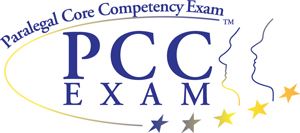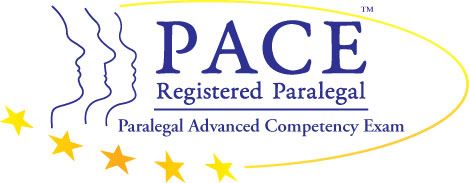- Home
- About Us
- Scholarships and Credentialing
- PACE & PCCE
PACE/PCCE™


Currently, there is no formal regulation scheme for paralegals in Pennsylvania. However, PAP recommends that paralegals obtain national certification in order to validate their experience and job skills, establish credentials and increase your value to your organization and clients. Since PAP is a charter member of the National Federation of Paralegal Associations (NFPA®), we encourage our members to seek national certification through NPFA by sitting for and passing either the Paralegal Core Competency Examination™ (PCCE) or Paralegal Advanced Competency Examination (PACE) ®.
PARALEGAL CORE COMPETENCY EXAMINATION (PCCE), an Entry Level Exam
At the 2009 NFPA Convention, delegates representing NFPA member associations from across the United States made history by passing a resolution to develop a basic proficiency exam known as the Paralegal CORE Competency Exam (PCCE). The PCC Exam tests the knowledge, skills and ability of individuals who are working as paralegals or just entering the profession.
On June 11, 2011, 188 paralegals took the PCC Exam pilot test at 12 test sites across the country. Of the paralegals who completed the test, 146 achieved a passing score of 550 or better. Those paralegals are the very first CORE Registered Paralegals and have earned the right to use the CRP credential.
As of November 14, 2011, the PCC Exam is now administered by computer at Prometric Test Centers throughout the United States and Canada. To be eligible to sit for the PCC Exam, a candidate must meet ONE of the following combinations of education/experience:
|
If you have this level of education… |
…you also need this level of EXPERIENCE/CLE |
|
Bachelor’s degree in any subject plus a Paralegal Certificate |
No experience or CLE required |
|
Bachelor’s degree in Paralegal Studies |
No experience or CLE required |
|
Bachelor’s degree in any subject but no Paralegal Certificate |
6 months experience and 1 hour of ethics taken in the year preceding the exam application date |
|
Associate’s degree in Paralegal Studies |
No experience or CLE required |
|
Associate’s degree in any subject other than Paralegal Studies, no paralegal certificate |
1 year paralegal experience and 6 hours of CLE (with at least 1 hour in ethics) taken during the 12 months prior to the submission of exam application |
|
Paralegal certificate from a program that meets or exceeds the requirements set forth in NFPA’s Short Term Paralegal Program Position Statement |
1 year experience and 6 hours of CLE, including 1 hour of ethics taken in the year preceding the exam application date |
|
High School Diploma (or GED) |
5 years’ experience and 12 hours of CLE, including 1 hour of ethics taken within the two years preceding the exam application date |
Additional questions may be directed to pcce@paralegals.org.
PARALEGAL ADVANCED COMPETENCY EXAM (PACE), an Advanced Exam for the Skilled and Experienced Paralegal
The Paralegal Advanced Competency Exam (PACE) is offered by NFPA to test the competency of experienced and skilled paralegals. This exam is one-of-a-kind, in that it is the ONLY certification exam that requires at least two (2) years of substantive paralegal experience for applicants to qualify to sit for the exam.
PACE tests critical thinking and problem-solving skills used by experienced paralegals. PACE, like the PCC Exam, is not state specific and is a national exam. PACE questions are level 3-4 and tests abilities to see the big picture. Please note, again, that PACE is not for entry-level paralegals as there are strict eligibility requirements.
A person is eligible under any ONE of the following combinations of education/experience:
| If you have this level of Education |
You also need this level of Experience |
|---|---|
| Bachelor's degree and completion of a paralegal program with an institutionally accredited school, said paralegal program may be embodied in a bachelor's degree |
Two Years of Paralegal Experience |
| Bachelor's degree in any course of study obtained from an institutionally accredited school | Three Years of Paralegal Experience |
| Associate’s degree in paralegal studies obtained from an institutionally accredited school, and/or ABA approved paralegal education program | Six Years of Paralegal Experience |
PAP is proud to count five CRPs™ and sixteen RPs® among its members:
Cynthia Ely, RP® (10/28/1997)
Barbara I. Nield, RP® (12/4/2000)
Donna Colarulo, RP® (10/13/2001)
Donna McConnell, RP® (7/1/2003)
Valerie Dolan, RP® (5/7/2004)
Sharon DeNofa, RP® (5/18/2007)
Robert Hrouda, RP® (4/26/2008)
Judy Stouffer, RP® (8/4/2008)
Elizabeth Montanti, RP® (9/4/2008)
Vivian Luckiewicz, RP® (6/6/2009)
Desiree M. Purvenas-Hayes, RP® (11/29/2010)
Diana M. Cook, RP® (12/30/2010)
Mary Rachael Swift, RP® (1/4/2011)
Kimberly A. Walker, RP® (2/4/2011)
Christine McClay RP® (7/21/2012)
Mary Lou O'Connell, RP® (3/9/2013)
Doreen Ziccardi, RP® (5/10/2013)
Robert L. Chudzinski, CRP™ (6/11/2011)
Clifton Oakley, CRP™ (5/29/2012)
Frank Innes, Jr., CRP™ (9/28/2012)
Victor Panieczko, CRP™ (11/6/2012)
Alex Sullivan, CRP™ (4/13/2013)
If you have any questions about the PACE or PCC™ Exam, please contact PAP's Paralegal Certification Ambassador, Vivian Luckiewicz, RP, Pa.C.P.
NFPA, PACE Registered Paralegal, RP, PACE, NFPA – The Leader of the Paralegal Profession and the NFPA design logo are all Registered Trademarks/Service Marks of NFPA; NFPA – Your Partner in your profession, PACE – The Standard for Excellence, NFPA Tech Institute, and the PACE design/logo are Trademarks/Service Marks of NFPA.
